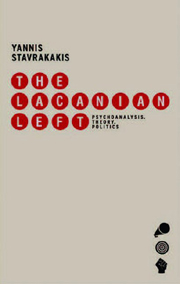Book contents
- Frontmatter
- Contents
- Bibliographical Note
- Acknowledgements
- Dedication
- Introduction: Locating the Lacanian Left
- PART I Theory: Dialectics of Disavowal
- PART II Analysis: Dialectics of Enjoyment
- 4 What Sticks? From Symbolic Power to Jouissance
- 5 Enjoying the Nation: A Success Story?
- 6 Lack of Passion: European Identity Revisited
- 7 The Consumerist ‘Politics of Jouissance’ and the Fantasy of Advertising
- 8 Democracy in Post-Democratic Times
- Bibliography
- Index
8 - Democracy in Post-Democratic Times
from PART II - Analysis: Dialectics of Enjoyment
Published online by Cambridge University Press: 12 September 2012
- Frontmatter
- Contents
- Bibliographical Note
- Acknowledgements
- Dedication
- Introduction: Locating the Lacanian Left
- PART I Theory: Dialectics of Disavowal
- PART II Analysis: Dialectics of Enjoyment
- 4 What Sticks? From Symbolic Power to Jouissance
- 5 Enjoying the Nation: A Success Story?
- 6 Lack of Passion: European Identity Revisited
- 7 The Consumerist ‘Politics of Jouissance’ and the Fantasy of Advertising
- 8 Democracy in Post-Democratic Times
- Bibliography
- Index
Summary
Nobody can protect humanity from folly or suicide
Cornelius CastoriadisVirtue, in a republic, is a very simple thing: it is love of the republic; it is a feeling and not a result of knowledge; the lowest man in the state, like the first, can have this feeling
MontesquieuDemocracy and the Lacanian Left: relations of ambivalence
Throughout this book, side by side with my critical explorations of the various theoretical projects associated with the Lacanian Left, side by side with the analyses of central socio-political phenomena undertaken from a Lacanian perspective, I have also been sketching – in an admittedly indirect way – some of the preconditions for a democratic ethics of the political, an orientation drawing on both Lacanian theory and theories of radical democracy. In fact, forging a link between the Lacanian ethics of psychoanalysis and radical democratic theory has already been one of the main aims of Lacan and the Political. Today, in the emerging post-democratic context, this orientation remains as topical as ever. At the same time, however, the need for a more thorough elaboration of certain aspects of the radical democratic project has never been so pressing. In the few years since my earlier work was published, the world has witnessed an increase in democratic rhetoric coupled with an unprecedented assault on the two traditional pillars of modern democracy: equality and liberty.
- Type
- Chapter
- Information
- The Lacanian LeftPsychoanalysis Theory Politics, pp. 254 - 285Publisher: Edinburgh University PressPrint publication year: 2007



